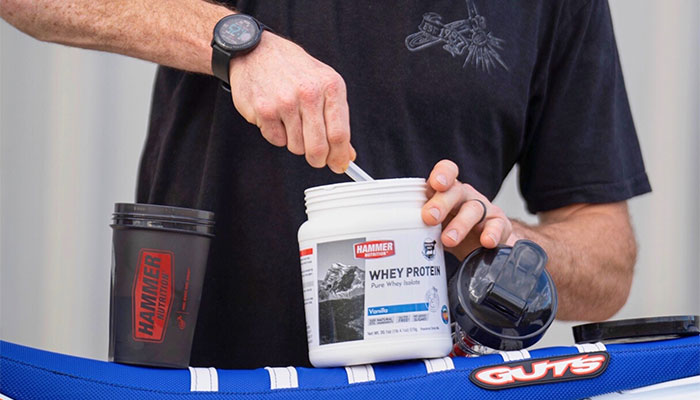
BY STEVE BORN
Of all the components of fueling - calorie intake, electrolyte replenishment, and fluid consumption - improper hydration has the most serious consequences attached to it. If you don't drink enough water, you'll suffer from painful and performance-ruining dehydration. Drink too much, however, and you'll not only end up with impaired athletic performance, you may even be flirting with potentially life-threatening water intoxication.
Dr. Tim Noakes, one of the most respected researchers on hydration, studied the effects of thousands of endurance athletes and noted that the front-runners typically tend to dehydrate, while over-hydration occurs most often among middle to back-of-the-pack athletes. Both conditions lead to hyponatremia (low blood sodium), but through different processes.
Excess water consumption causes what is known as dilutional hyponatremia, or an overly diluted level of sodium and electrolytes in the blood. This is bad, just as under-hydrating is, because of the increased potential for muscular cramping, but has the added disadvantages of stomach discomfort, bloating, and extra urine output. And, as mentioned earlier, in some unfortunate circumstances, excess hydration can lead to severe physiological problems, including death.
How much fluid should you drink before a workout or race?
These are the two recommendations that we believe will satisfy hydration needs without putting you at risk for over-hydration:
- One liter of fluid (about 34 ounces) in the two hours prior to the start (about 17 ounces/500 milliliters per hour), ceasing consumption about 20-30 minutes before you begin the workout or race.
- If you have more than two hours before your race start, consume 10-12 ounces (approx. 295-355 milliliters) of fluid every hour leading up to the race, finishing consumption 30 minutes prior to the start.
How much fluid should you drink during a workout or race?
Another expert on hydration, Dr. Ian Rogers, suggests that between 500-750 milliliters/hour (about 17-25 fluid ounces/hour) will fulfill most athletes' hydration requirements under most conditions: The American College of Sports Medicine in its position statement, currently recommends a fluid intake during exercise of 600-1200 mls/hr. The fluid intake of most of the reported cases of exercise associated hyponatremia has been at the middle or upper end of this range challenging this as an appropriate fluid intake. A more realistic intake is likely to be 500-750mls/hr.
Average-size athlete, average temps
20-25 oz./hr. (approx. 590-740 ml/hr.) is an appropriate fluid intake for most athletes under most conditions.
Lighter athletes and/or cooler temps
For lighter-weight athletes or those exercising in cooler temperatures, 16-18 oz./hr. (approx. 473-532 ml) may be perfect.
Heavier athletes and/or hotter temps
Heavier athletes or athletes competing in hotter conditions may consider intakes upwards of 28 oz./hr. (approx. 830 ml/hr.).
Keep in mind that even though these are our recommendations, you need to determine what works best for your system and the particular logistics of the race or training session ahead.
Fluid intake suggestions apart from the workout or race
Multiplying your body weight in pounds by 0.5-0.6 will give you the figure, in fluid ounces, which you should aim for daily.
Caveat: If you have not been following this recommendation consistently, you'll want to start increasing your daily water consumption gradually until you reach your target amount. If you increase your fluid intake too quickly it will overwhelm your body with too much fluid too soon, which may increase the potential for hyponatremia.
Summary
According to Dr. Bill Misner, The human body has so many survival safeguards by which it regulates living one more minute, that when we try too hard to fulfill all its needs we interfere, doing more harm than good. To suggest that fluid replenishment can happen at the same rate it is spent during exercise is simply not true. The goal of fueling during endurance exercise is to postpone fatigue, not to replace all the fuel, fluids, and electrolytes lost during the event. It can't be done, though many of us have tried.
Keeping in mind Dr. Misner's words of wisdom, follow our guidelines to help you get your fluid intake amounts dialed in. You'll feel better all throughout the day, you'll enter a workout or race properly hydrated, and you'll stave off both dehydration and over-hydration during exercise, which translates into improved performance.








